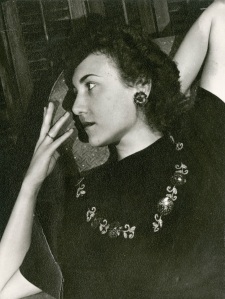"I kept his shoes. He would need them, if he was to come back."
Joan Didion, "The Year of Magical Thinking"
My grandmother, circa 1945
When we lose a loved one we are only left with three things: our memories of them, the ways they changed our lives for the better, and the stuff they left behind.
The stuff they left behind is the only tangible thing on this list. This is what makes "grief clutter" so difficult to part with. It is the most emotional kind of clutter there is.
I'm very much still learning to deal with grief clutter. I was closer to my grandmother than I am to my father. She passed away over two years ago and yet I still have a terrible time bringing myself to even think about getting rid of many of Gram's things.
I'm going to spend more than one post on this topic because hoarding is a coping mechanism in my family. Gram was very involved in all of our lives and nothing we've had to cope with in the last few years has been as difficult as her death. I know this event plays a role in my mother's clutter-related behavior and mine. But whether or not you are a hoarder or the child of hoarders, losing a loved one is hard. Parting with their belongings is not easy.
Over the coming weeks I'll be writing posts about dealing with clutter following the loss of a loved one. Some will be about strategies for parting with this "grief clutter," and some will be about hoarding as a coping mechanism for grief and other stresses. Hopefully this series won't be depressing but instead will help us realize that the truly important things our loved ones leave us with are the intangible ones.
What objects have you held onto from family and friends you've lost? What have you gotten rid of? Why those objects?

I've seen a lot of family leave this earth. Both my parents, all of my grandparents and other relatives. I have the coffee table from my childhood that we still use today, a red bandanna my father owned, a box of his "treasures," my mother's paintings and some of my grandparents' quilts they made. Pretty much the rest is gone but what I've kept we actually use to remember them with love.
ReplyDeleteThank you for the comment Annie! I'm learning that lesson slowly. It's a great lesson to learn. Would you mind if I share your comment in a future post? (and credit you, of course!) Love your blog, looking forward to trying out your soap recipes when we run out of our store-bought stuff.
ReplyDeleteWhen I cleaned out the home of my grandparents, it was difficult at the time to decide what to keep and what to let go. So many things had been permanent fixtures in their home for nearly 70 years. I moved many of them to our new home, which felt important because my grandfather would be living with me and I wanted to recreate a place with as much familiarity as possible. Nearly three years later, I have parted with so much that felt critical to keep at the time of the clean-out. The tea cups that my grandmother always used for company haven't been used even once since we moved. The pictures from their walls feel and look different on mine. Out of context, they don't mean much anymore. I've been letting a lot of it go and it has been liberating to do so. The things I find myself holding onto are the things I use, the things that she used, the things that connect me to her through daily activities, like the enamel colander that she bought when she got engaged to my grandfather in the 1930's. I use it almost every day, just like she did for seven decades. If it turns out to be the only tangible thing that I keep from her house, it will be enough for me.
ReplyDeleteHi Julie, thanks for sharing your story! It really emphasizes that time is key when it comes to dealing with grief clutter. Eventually, most of it we can let go of, and the truly meaningful things will stand out, be kept, and be treasured. Thanks for your comment!
Deletequé guapa
ReplyDelete